Scumbag Millionaires –
Oct. 23, 2020 – Walmart has been tightening its policies on filling opioid prescriptions, according to its “opioid stewardship initiative” – not just questioning particular scripts, but refusing to fill any prescription for controlled substances from doctors about whom the company had doubts. In part to appease federal regulators, Walmart applied various restrictions on controlled substances. But soon state authorities accused the company of violating state regulations – even of committing crimes – by blocking prescriptions or even just filling smaller quantities of drugs than doctors had specified. The company also received pushback from medical groups that accused Walmart of trampling on doctors’ prescribing prerogatives.
Walmart’s damned-if-you-fill-the-script, damned-if-you-don’t bind reflects the problems faced by large chain pharmacies, which also include CVS and Walgreens. They are among the chief targets in opioid-related lawsuits that may be some of the most complicated and expensive litigation in American history – the so-called National Prescription Opiate Litigation. The companies didn’t get there on their own: Contradictory regulations, demands, and threats from Washington and the states have combined to create a tangle trapping the pharmacies, leaving them exposed to plaintiffs’ lawyers in a massive “multi-district litigation” playing out in an Ohio court.
The nationwide tobacco litigation of the 1990s was complex enough, involving the states and a handful of cigarette manufacturers. By contrast, plaintiffs in the National Prescription Opiate Litigation – counties, boroughs, parishes, cities, townships, municipalities, and villages – number in the thousands. They are looking for just about everyone in the opioid business – manufacturers, distributors, and retailers – to pay for the opioid misuse that has been so costly to society. Plaintiffs’ lawyers are seeking damages well into the billions.



